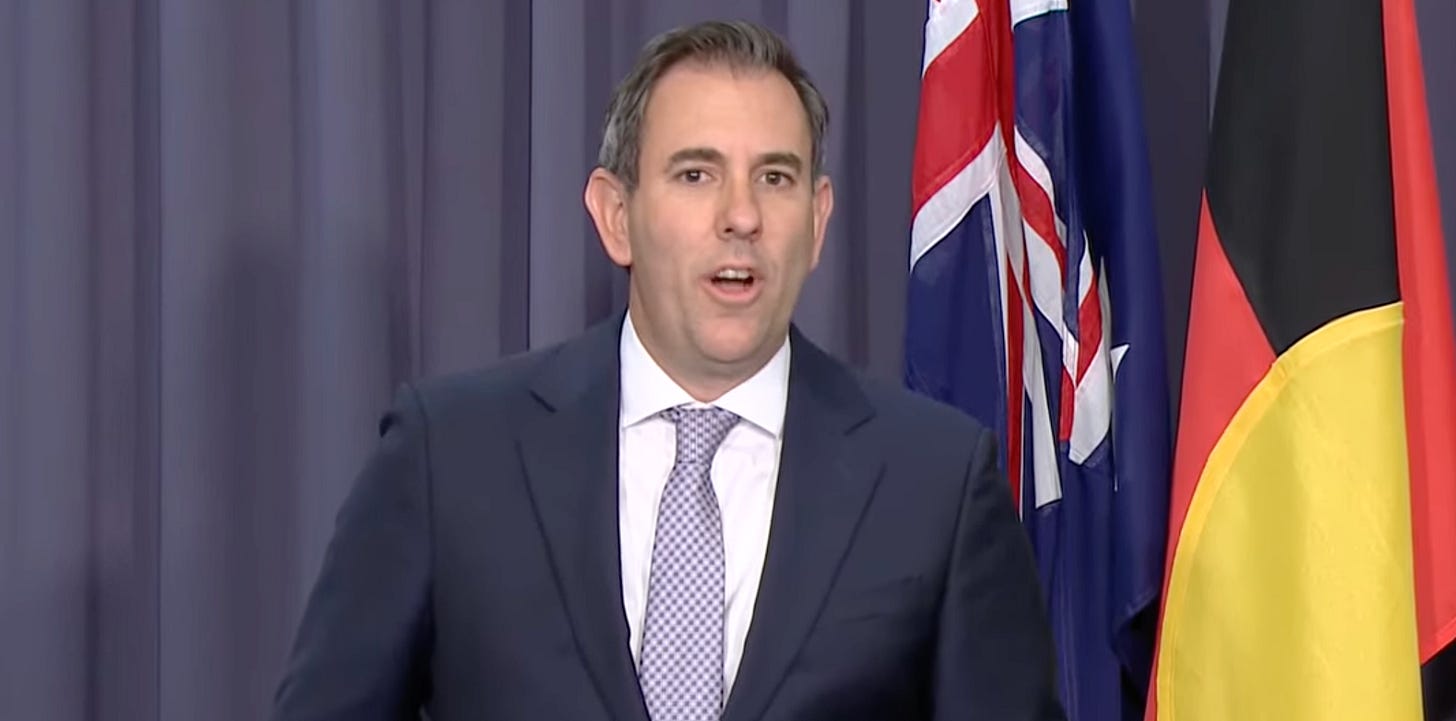Government Delivers $10 Billion Deficit, Claims Biggest Budget Turnaround in Parliamentary History
Today’s Article is brought to you by Empower your podcasting vision with a suite of creative solutions at your fingertips.
This piece is freely available to read. Become a paid subscriber today and help keep Mencari News financially afloat so that we can continue to pay our writers for their insight and expertise.
Treasurer Jim Chalmers announced a $10 billion deficit for the 2024-25 financial year, marking what he called the largest positive budget improvement in a single parliamentary term as the government defended its economic management and handling of the Optus telecommunications crisis.
The final budget outcome released today showed the deficit came in nearly $18 billion better than forecast at the pre-election outlook and $37 billion better than the 2022 projection inherited from the Coalition, Chalmers told reporters at Parliament House.
“In dollar terms, this is the biggest ever positive improvement in the budget in a single parliamentary term,” Chalmers said. “In just three years in office, we’ve been able to engineer a $209 billion improvement in the budget over those three years.”
The Treasurer said the government turned two Liberal deficits into two Labor surpluses in its first two years before delivering the reduced deficit in its third year.
Truth matters. Quality journalism costs.
Your subscription to Mencari directly funds the investigative reporting our democracy needs. For less than a coffee per week, you enable our journalists to uncover stories that powerful interests would rather keep hidden. There is no corporate influence involved. No compromises. Just honest journalism when we need it most.
Not ready to be paid subscribe, but appreciate the newsletter ? Grab us a beer or snag the exclusive ad spot at the top of next week's newsletter.
Debt Reduction Claims
Chalmers emphasized debt reduction as a centerpiece of the government’s fiscal record, stating debt now sits $188 billion lower than what Labor inherited.
“This $10 billion deficit is a fifth of what we inherited, and it’s around a third of what the Treasury forecast before the election,” he said. “Because of our responsible economic management, that means that we will pay something like $60 billion less debt interest over the course of the next decade or so.”
As a share of GDP, the deficit represents about a fifth of the average between the global financial crisis and the start of COVID-19, according to Chalmers.
Finance Minister Katie Gallagher attributed the improvement since the pre-election outlook to lower payments of approximately $4.6 billion and higher receipts of $13.1 billion, driven by strong labor market performance flowing through company and income tax collections.
“The improvements since PIFO are really due to two things, lower payments and a better than expected outcome for receipts,” Gallagher said, noting national partnership payments with states accounted for more than $3 billion of the payment reductions.
Optus Crisis Response
When pressed on three catastrophic Optus network failures affecting triple zero emergency services, Chalmers defended the government’s decision to direct the Australian Communications and Media Authority to investigate rather than launch an independent inquiry as demanded by the opposition.
“This is an absolutely shocking failure from Optus,” Chalmers said. “The most appropriate course of action for the government to take to get to the bottom of this is to ask ACMA to conduct a very thorough investigation.”
Chalmers rejected suggestions that Australians were losing faith in the triple zero system, stating the government was taking the matter seriously. “Telecommunications companies have obligations under the law to ensure that triple zero calls connect. This can’t happen again,” he said.
The Treasurer said the government would closely monitor ACMA’s investigation and consider whether further actions were necessary throughout the process.
PM’s UK Visit Defended
Chalmers strongly defended Prime Minister Anthony Albanese’s attendance at a UK Labour Party conference, dismissing opposition criticism as political point-scoring.
“It’s entirely appropriate for the Prime Minister to take the opportunity to meet with the Prime Minister of the UK, the King, the leader of the opposition in the UK, the Prime Minister of Canada, the Prime Minister of Spain,” Chalmers said. “That strikes me as a very good use of the Prime Minister’s time.”
When asked whether delivering a speech at a party political conference crossed a line, Chalmers noted that slot at the conference had traditionally been given by a leader of another country and was not unusual. He emphasized Albanese met with both sides of politics during the UK visit.
Communications Minister’s Travel
The Treasurer also rejected opposition attacks on Communications Minister Annika Wells for traveling to New York to discuss social media protections in the days after the Optus outage.
“I think anyone who knows Minister Wells knows that she would have been taking her responsibilities in the Optus matter very seriously at the same time as she advanced on the global stage our world-leading new regime to protect kids in social media,” Chalmers said. “It’s possible to do both of those things at once.”
Strong Labor Market Boosts Revenue
Chalmers attributed much of the budget improvement to strong employment figures, with pay-as-you-go tax receipts coming in $12 billion higher than forecast and superannuation tax $6 billion above projections.
“One of the key reasons why the budget is stronger is because more people are working more and earning more,” he said. “That is a source of considerable pride to our government, not just because it’s good for the budget, but because it’s good for millions of Australian workers.”
The government has overseen the lowest average unemployment rate of any government in the last 50 years, with more than 1.1 million jobs created, according to Chalmers. He contrasted this with what he called nearly a decade of wage suppression under the previous government.
“Under this government, we’ve seen the lowest average unemployment rate of any government in the last 50 years,” he said.
Tax Cuts and Bracket Creep
When asked about bracket creep propping up the budget through higher pay-as-you-go collections, Chalmers pointed to three rounds of income tax cuts delivered or planned by the government.
“We cut income taxes last year, we’re cutting them next year, we’re cutting them the year after,” he said, noting the second and third rounds were at risk during the election. “Because we won the election not that long ago, millions of Australians will get two more tax cuts.”
Chalmers said the government had shown enthusiasm for returning bracket creep where affordable, distinguishing Labor’s approach from the opposition’s preference for targeting tax relief to higher earners.
The Treasurer also pushed back on opposition references to a tax cap, noting the Howard government breached or equaled the 23.9% threshold five times. “The highest taxing government in recent times was the Howard and Costello government,” he said.
Tobacco Compliance Challenges
Chalmers acknowledged ongoing challenges with tobacco excise compliance, with collections down $2.5 billion year-over-year despite coming in $440 million higher than budget forecasts.
“There are two reasons why we’ve seen the tobacco tax take down. One of them is a good reason, people giving up cigarettes, one of them is a bad reason, which is people getting around the compliance regime,” he said.
The government has allocated hundreds of millions of dollars for enhanced compliance efforts, with Chalmers pointing to recent enforcement successes. “We have seen in recent months some very welcome compliance activity,” he said, while acknowledging the challenge persists.
Smelter Support Under Consideration
On questions about potential taxpayer support for struggling aluminum smelters in Mount Isa, Tomago, Bell Bay and elsewhere, Chalmers said value for money would guide government decisions.
“We have been working really closely with Tim Ayres, with Chris Bowen and with other colleagues about the future of those smelters. It’s no secret that they are under extreme pressure,” he said.
Chalmers said the government was engaging with four state governments on the issue but declined to provide details due to commercial sensitivities. “We’re prepared to do the right thing if we can afford to and if we get value for money, if it’s consistent with the government’s values and priorities,” he said.
The Treasurer emphasized protecting workers at facilities like the Mount Isa smelter, which he said he knew well. “We need to make sure those workers are front and center. The hundreds of workers in Mount Isa and in these other places, they are our focus,” he said.
Energy Relief Future Uncertain
Chalmers left open the question of whether household energy bill relief worth $3.4 billion would continue beyond its current expiration, stating the rebates would not be a permanent budget feature.
“We keep them under review from budget update to budget update,” he said, noting the mid-year economic and fiscal outlook would be released before the rebates run out. “They won’t be in there forever. We try and do what we responsibly can, affordably can, to help people with the cost of living.”
Defense Spending Timing
When questioned about appearing to underspend on defense by $1.5 billion, Gallagher attributed the difference to timing variations in large multi-billion dollar programs.
“It’s not unusual from a timing point of view when you’ve got these large programs, multi-billion dollar programs moving around that you’ll have changes in payment times,” she said. “But the money is there. We’ve done nothing more than increased defence spending since coming to government.”
Republic Referendum Ruled Out
Chalmers confirmed the Prime Minister’s position that no referendum would be held during the government’s second term, following the unsuccessful voice referendum.
“I believe, I think a lot of Australians believe that our future is one with an Australian head of state, but we’ve got other more pressing priorities,” Chalmers said, identifying himself as part of the republican community. “The government’s got a huge agenda. Our primary focus is on delivering that agenda that we took to the last election.”
Reserve Bank Meeting
Without predicting the outcome of the current Reserve Bank board meeting, Chalmers noted that no market participants or economists expected a rate cut announcement. He emphasized that three interest rate cuts over six months this year reflected progress on inflation.
“What that reflects is the very welcome, encouraging progress that Australians have made together on inflation,” he said. “Without that downward pressure on inflation, the Reserve Bank wouldn’t have had the confidence to cut rates three times over the course of this year.”
Broader Economic Context
Chalmers argued the budget outcome demonstrated effective calibration of fiscal policy to economic conditions, highlighting low unemployment, real wage growth, declining inflation and recent interest rate cuts as evidence of economic progress.
“This gives us one of the strongest budgets and economies in the G20,” he said. “Australians should be proud of the progress that we’ve made in our budget and in our economy, but we acknowledge as a government that there is more work to do.”
The government achieved the outcome through $100 billion in savings over three years, banking about 70% of upward revenue revisions and maintaining spending restraint, according to Chalmers. He contrasted this with the previous government having zero savings in its final budget.
Gallagher noted budget pressures continue to grow and increase, with more work required through the mid-year update and next year’s budget.
Sustaining Mencari Requires Your Support
Independent journalism costs money. Help us continue delivering in-depth investigations and unfiltered commentary on the world's real stories. Your financial contribution enables thorough investigative work and thoughtful analysis, all supported by a dedicated community committed to accuracy and transparency.
Subscribe today to unlock our full archive of investigative reporting and fearless analysis. Subscribing to independent media outlets represents more than just information consumption—it embodies a commitment to factual reporting.
As well as knowing you’re keeping Mencari (Australia) alive, you’ll also get:
Get breaking news AS IT HAPPENS - Gain instant access to our real-time coverage and analysis when major stories break, keeping you ahead of the curve
Unlock our COMPLETE content library - Enjoy unlimited access to every newsletter, podcast episode, and exclusive archive—all seamlessly available in your favorite podcast apps.
Join the conversation that matters - Be part of our vibrant community with full commenting privileges on all content, directly supporting The Evening Post (Australia)
Catch up on some of Mencari’s recent stories:
It only takes a minute to help us investigate fearlessly and expose lies and wrongdoing to hold power accountable. Thanks!








